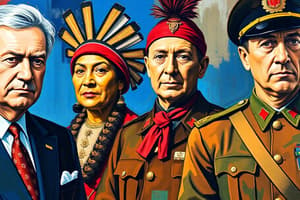Podcast
Questions and Answers
What is a primary difference between a hero and a leader as discussed in ancient texts?
What is a primary difference between a hero and a leader as discussed in ancient texts?
- A leader must have supernatural abilities.
- A hero is often a political figure.
- A leader can be a hero, but a hero is not always a leader. (correct)
- A hero always leads others.
Which literary form is commonly found across ancient cultures discussed in the content?
Which literary form is commonly found across ancient cultures discussed in the content?
- Lyrical poetry
- Epic poetry (correct)
- Prose fiction
- Sonnet
What event marks the end of the ancient world in Europe?
What event marks the end of the ancient world in Europe?
- The fall of Constantinople
- The beginning of the Renaissance
- The founding of Rome
- The fall of Rome in 476 C.E. (correct)
In which epic is the title character two-thirds god and one-third human?
In which epic is the title character two-thirds god and one-third human?
The character Odysseus is protected by which goddess in his journeys?
The character Odysseus is protected by which goddess in his journeys?
What role do societal and religious expectations play in ancient texts?
What role do societal and religious expectations play in ancient texts?
Which text argues that there are no real heroes and only flawed gods and humans?
Which text argues that there are no real heroes and only flawed gods and humans?
What is a significant consequence of the fall of the Gupta Empire?
What is a significant consequence of the fall of the Gupta Empire?
Study Notes
Defining Heroes and Leaders
- The text explores the concepts of heroes and leaders, highlighting that while a leader can be a hero, a hero is not always a leader.
- Family love is a major driving force for characters, while romantic love, while present, is explored less.
- Social and religious expectations significantly influence characters' actions.
Cultural Influences and Religious Beliefs
- Understanding the religious beliefs of each culture is crucial for comprehending the texts.
- The ancient world's end is marked by different events for different cultures.
- For instance, the fall of Rome in 476 C.E. is significant for Europe, but irrelevant for cultures like China and India.
- The unification of China under the Qin dynasty in 221 B.C.E. marks the end of Ancient China and the beginning of the Dynastic Period.
- Classical India's end is debated, ranging between 550 C.E. (with the fall of the Gupta Empire) and 1206 C.E. (with the establishment of the Delhi Sultanate).
Epic Poetry and Supernatural Elements
- Epic poetry is a common thread in many ancient cultures.
- Epic heroes often possess supernatural abilities, are demigods, or receive divine assistance.
- Gilgamesh in Gilgamesh is two-thirds god and one-third human.
- Achilles in the Iliad and Aeneas in the Aeneid are both sons of a goddess and a mortal man.
- Odysseus, while not a demigod, is favored by the goddess Athena.
- The Mahabharata features demigod warriors, while the Ramayana's main character, Rama, is an avatar of the god Vishnu.
The Metamorphoses: Challenging Heroic Norms
- Ovid's Metamorphoses deviates from traditional epic conventions, arguing that heroes are not real.
- Instead, it presents a cyclical history shaped by the actions of fallible gods and humans.
Foundational Texts and Lasting Influence
- Many ancient texts are fundamental to their respective societies.
- Greek and Roman epics and ancient Greek drama are the foundation of Western literature.
- References to these works, including the Trojan War, Ovid, and Oedipus, permeate various forms of media.
- Sun Tzu's The Art of War remains influential globally.
- Characters from the Mahabharata and Ramayana are still referenced in everyday conversation in India.
- Confucian ethics profoundly influenced Chinese thought for over two thousand years.
Studying That Suits You
Use AI to generate personalized quizzes and flashcards to suit your learning preferences.
Description
This quiz delves into the definitions of heroes and leaders, emphasizing the distinct characteristics that define each. It also explores the impact of family and romantic love on characters, as well as the significance of cultural and religious influences within historical contexts. Test your knowledge on these themes and their effects on societal actions.




